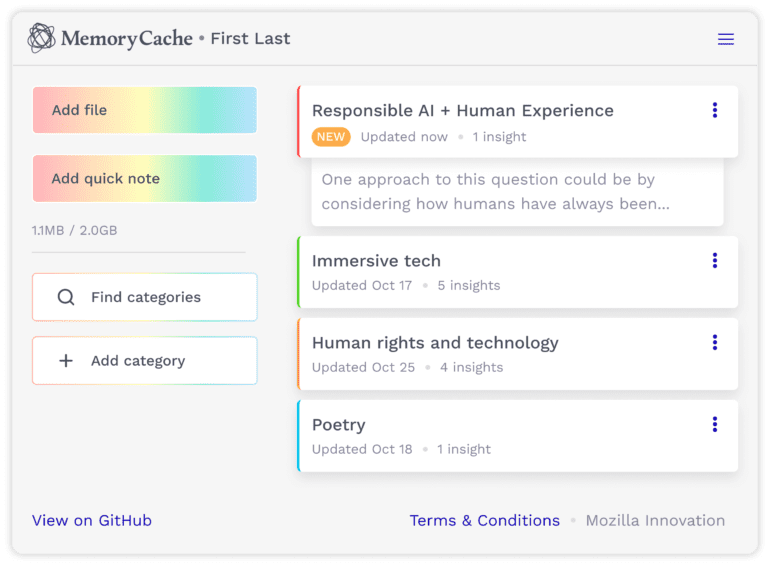TL;DR:
- MemoryCache by Mozilla is a browser add-on combining on-device machine learning with local file storage.
- It enhances user privacy while delivering a personalized browsing experience.
- Users can discreetly save web pages as PDFs and notes to their local machine.
- MemoryCache prevents generalized responses by storing pages locally and adding personal data.
- It aligns with the trend of on-device AI and demonstrates compatibility with advanced models.
- This innovation signifies the evolution of web browsing toward enhanced personalization and privacy.
Main AI News:
In today’s tech-driven landscape, machine learning is at the forefront of transformation. It not only shapes various technical domains but also revolutionizes how we interact with the ever-evolving online world, where data and connectivity reign supreme. Yet, the quest for training extensive language and multimedia models, aspiring to comprehend the vast expanse of the internet, raises profound concerns – socioeconomic, legal, and ethical. Issues surrounding copyright, safety, transparency, accessibility, and representation loom large in this endeavor.
Enter Mozilla, with an ingenious solution – MemoryCache. This groundbreaking browser add-on is poised to redefine user privacy while delivering a tailored web browsing experience. MemoryCache seamlessly blends on-device machine learning models with locally stored browser files, ensuring users wield control over their data without compromising on convenience. In essence, MemoryCache’s primary mission is to provide users with a personalized browsing journey, all while upholding the tenets of privacy and autonomy.
At the core of MemoryCache’s functionality lies a Firefox extension that enables users to save web pages discreetly into a designated subdirectory within their Downloads folder. This novel feature allows web pages to be covertly saved as PDFs, enhancing accessibility for others. By default, pages are saved in HTML format in Firefox. Furthermore, the extension facilitates the quick saving of notes and information from the browser to the user’s local machine. A shell script, integrated into the project, actively monitors changes within the MemoryCache directory in Downloads and triggers the privateGPT ingest.py script accordingly.
MemoryCache goes beyond mere data storage; it enriches the user experience by preventing generalized responses. It achieves this by housing web pages locally and augmenting the model with 75.3MB of personal data documents in its testing environment. MemoryCache harnesses the prowess of machine learning to empower users with a bespoke computing experience, acknowledging the myriad insights that can be gleaned from the content we generate and consume.
The researchers behind MemoryCache highlight its alignment with the burgeoning trend of on-device AI, an increasingly popular phenomenon. While MemoryCache is still in its nascent stages, it already exhibits potential as a valuable tool for efficiently segmenting and indexing web pages for semantic search. The project showcases its compatibility with Nomic AI’s groovy.ggml version of the gpt-4-all model, running smoothly on a gaming PC equipped with an Intel i7-8700 processor.
Conclusion:
Mozilla’s MemoryCache represents a significant leap forward in the web browsing landscape. By prioritizing user privacy and personalization, it addresses key concerns surrounding data access and control. As on-device AI gains prominence, MemoryCache positions itself as a valuable asset in the quest for more tailored and secure online experiences. This development underscores the market’s growing appetite for technologies that empower users while safeguarding their data.

